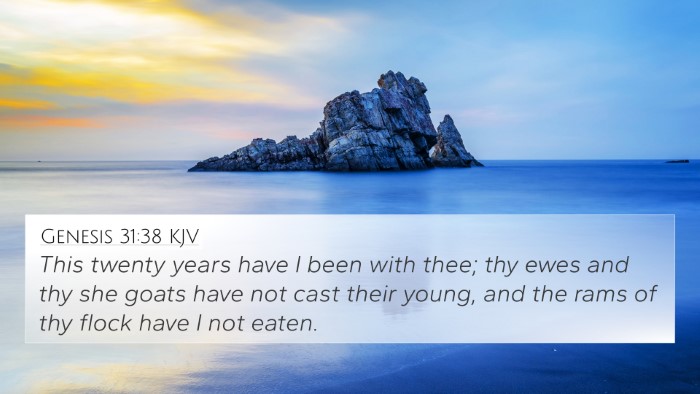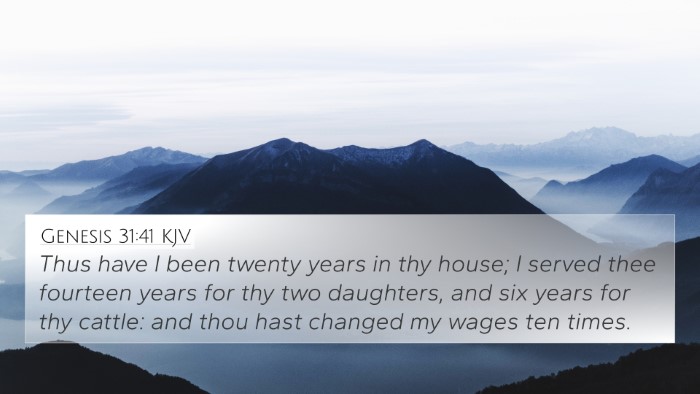Understanding Genesis 27:44
Genesis 27:44 states: "And tarry with him a few days, until thy brother's fury turn away." This verse is part of the narrative concerning Jacob and Esau, illustrating the themes of family conflict, divine providence, and the complexities of human relationships.
Commentary Insights
This verse has attracted various reflections from prominent biblical commentaries, namely Matthew Henry, Albert Barnes, and Adam Clarke. Below is a synthesis of their insights:
Matthew Henry's Commentary
Henry emphasizes the importance of wisdom in navigating familial relationships. In Genesis 27, we see Rebekah advising Jacob to flee to her brother Laban to escape Esau's wrath after Jacob deceives his father Isaac and receives the blessing meant for Esau. Henry discusses the idea of waiting on God for the right moment to return, highlighting that sometimes distance can soothe tensions and allow for reconciliation.
Albert Barnes' Notes
Barnes examines the implications of Rebecca's counsel to Jacob. He points out that the temporary nature of Jacob's departure signifies a need for healing in the family. The phrase "few days" does not imply a lengthy absence but rather a brief period necessary for Esau's anger to subside. Barnes also notes that this event foreshadows future divisions in the family and the overarching narrative of God’s providential care, which would eventually bring unity.
Adam Clarke's Commentary
Clarke focuses on the practical aspects of the advice given in this verse. He reflects on the necessity of caution and prudence in our dealings with conflict-prone situations. Clarke indicates that Rebekah’s concern for Jacob's safety was paramount, and her encouragement to retreat is a testimony to her wisdom as a mother. He also aligns this narrative with the theme of divine guidance, suggesting that such events are part of God’s greater plan for Jacob and Israel.
Bible Cross References
Genesis 27:44 can be connected through various other scriptures, which enrich the understanding of its context and implications. Below are some useful cross-references:
- Genesis 25:29-34 - The selling of Esau's birthright.
- Genesis 27:1-29 - The account of Jacob receiving Isaac's blessing.
- Genesis 28:1-5 - Jacob's departure to Laban.
- Genesis 32:3-6 - Jacob prepares to meet Esau after years apart.
- Hebrews 12:16-17 - A reflection on Esau's loss of blessing and birthright.
- James 1:20 - A verse that speaks to the nature of wrath, echoing Esau's fury.
- Romans 9:10-13 - The divine choosing of Jacob over Esau, establishing the premise of God’s sovereign decision.
- Proverbs 14:29 - A verse regarding patience in anger, aligning with the context of Esau's fury.
- Psalm 37:1-2 - The relief of the righteous, contrasting Jacob and Esau's fates.
- Isaiah 54:17 - Assurance that opposition cannot prevail against God's people, reflecting the eventual triumph of Jacob.
Conclusion
Genesis 27:44 reminds us of the need for restraint in the face of familial discord and the potential for healing when we allow emotions to cool. The insights from various commentaries provide a deeper understanding of the dynamics in play and the foresight of God’s hand governing these events. This scripture invites us to reflect on similar principles throughout the Bible, showcasing how inter-Biblical dialogue offers rich themes of reconciliation, conflict, and divine purpose.
Using Cross-References in Bible Study
For those seeking to engage in deeper scriptural study, utilizing bible cross-reference tools can be transformative. These tools assist in identifying connections between scripture and understanding the thematic links that exist throughout the Bible.
To effectively use cross-references:
- Identify key themes within the verse, as seen in Genesis 27:44, to find parallel passages.
- Utilize a Bible concordance to trace similar words or events.
- Engage in comprehensive Bible cross-reference materials for in-depth studies.
- Participate in cross-reference Bible study groups for shared insights and variations in interpretation.
- Look for linking Bible scriptures that enhance your thematic understanding.




